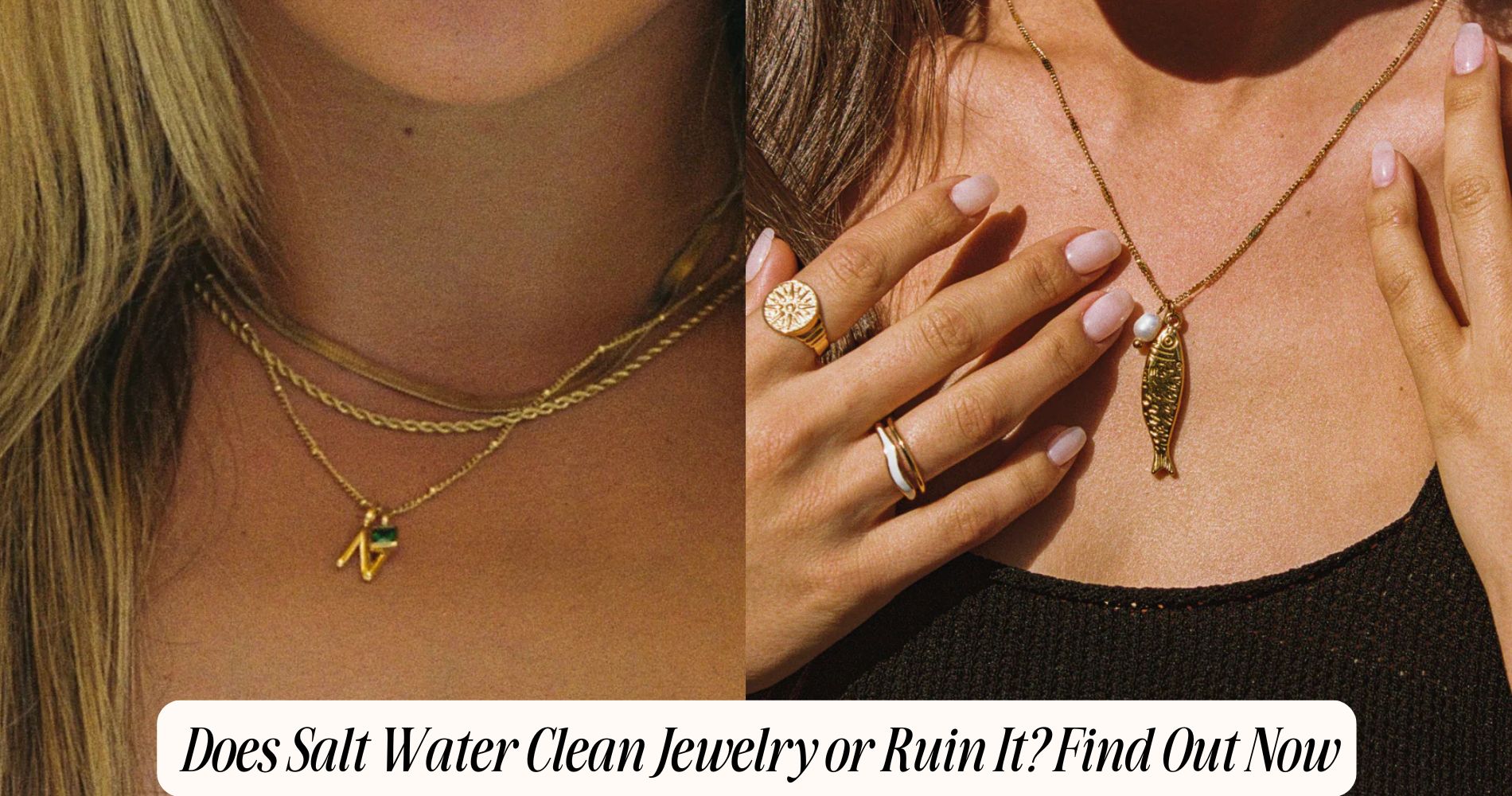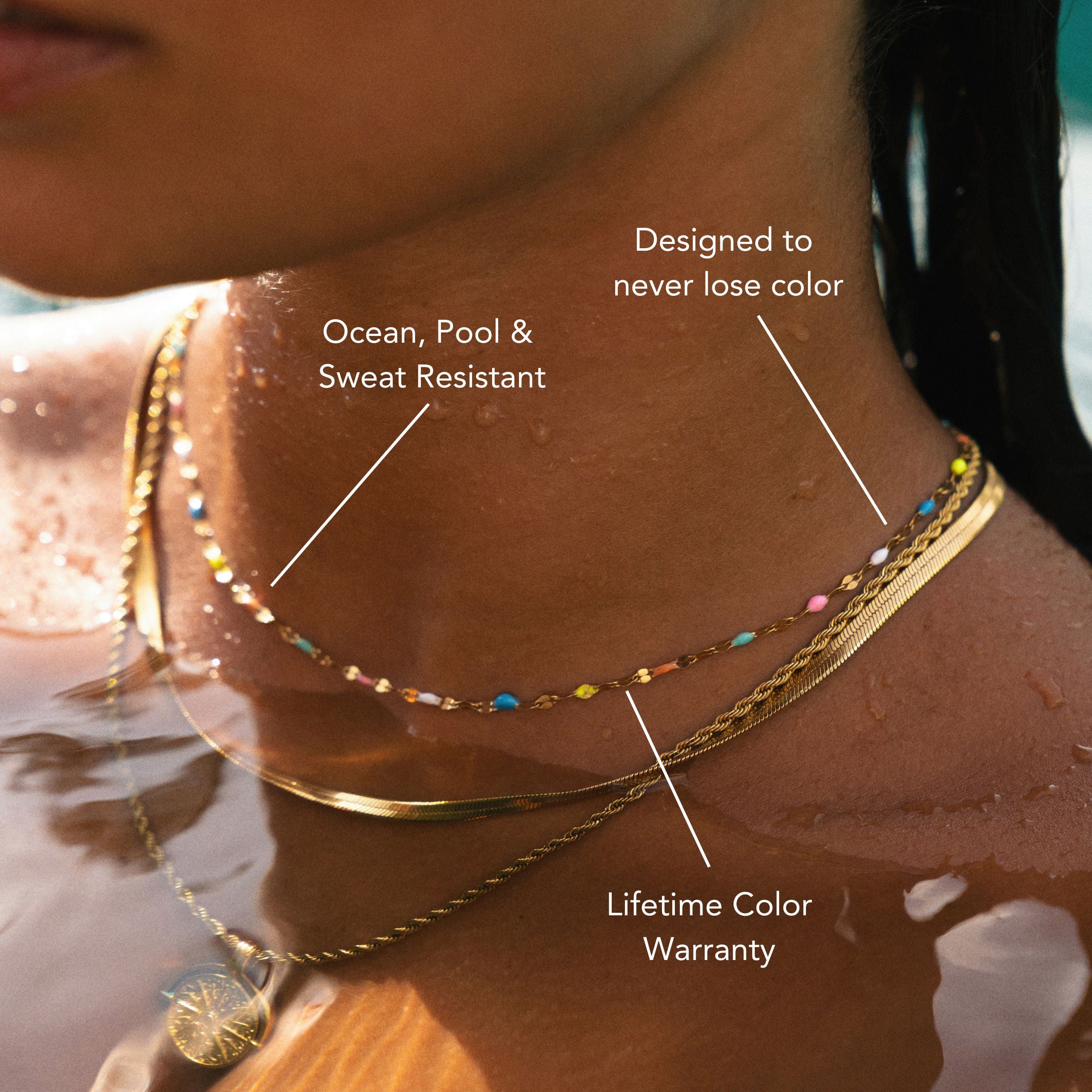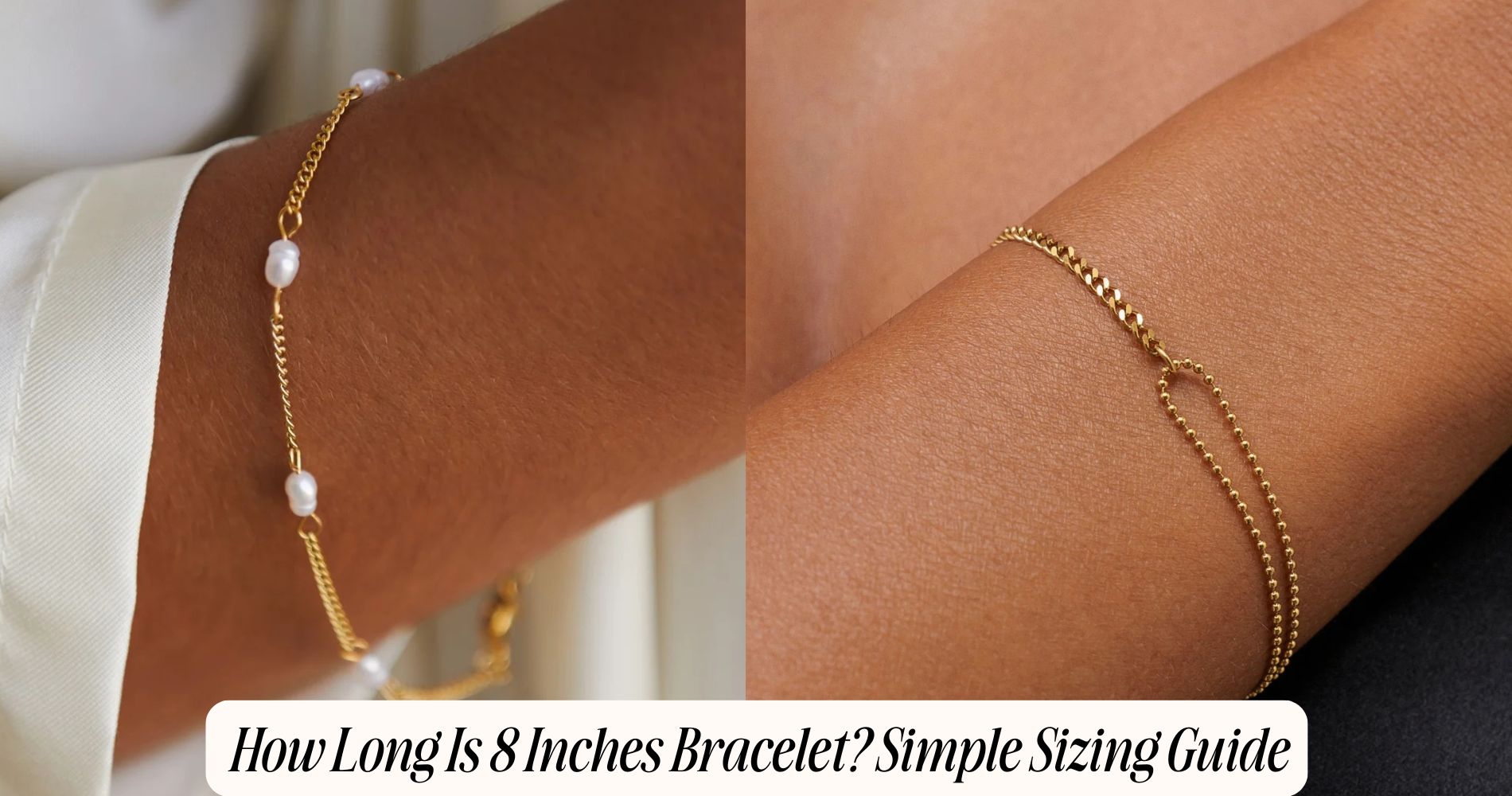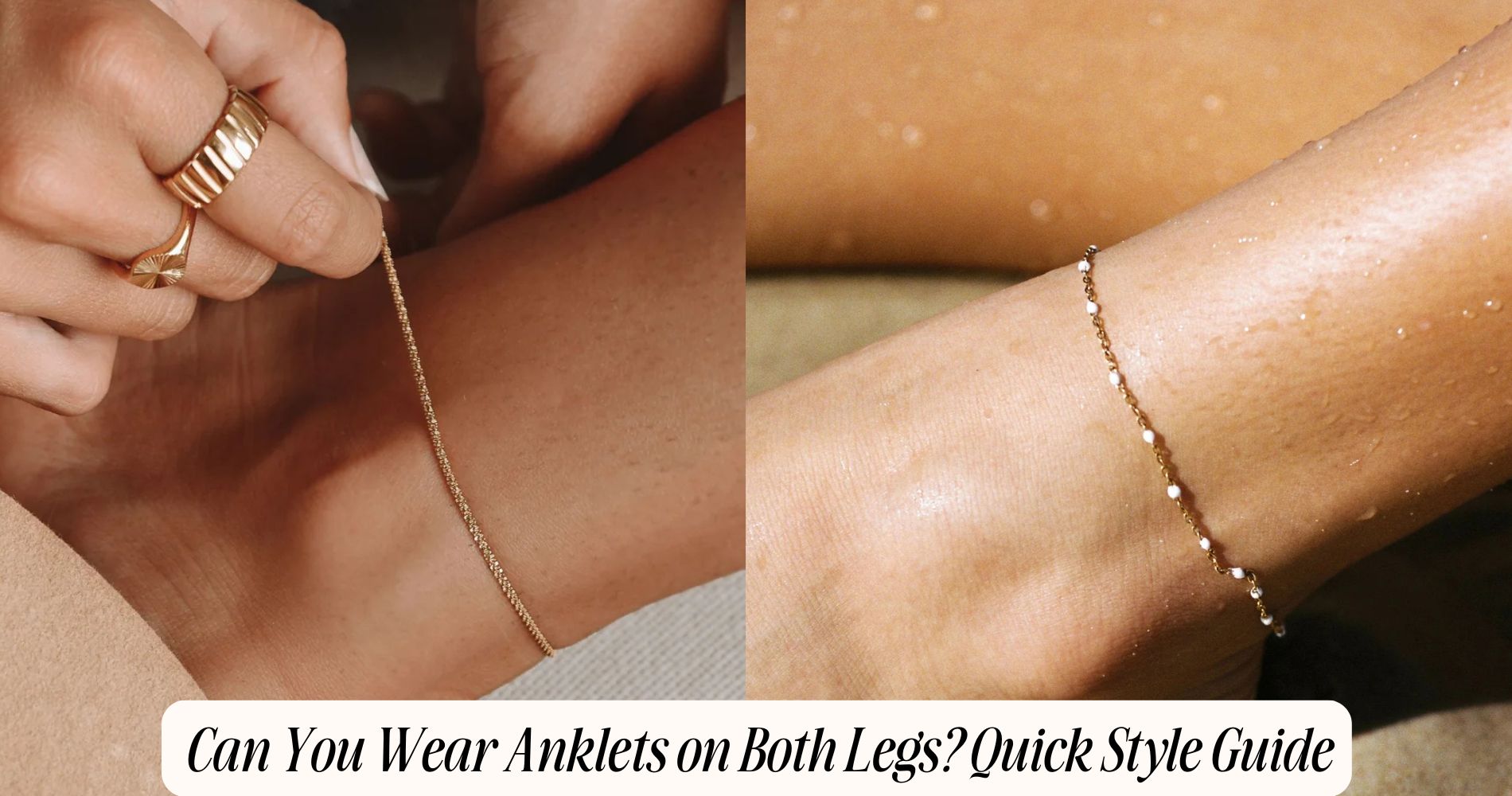
Does Salt Water Clean Jewelry or Ruin It? Find Out Now
Does salt water clean jewelry? Actually, no—it does the opposite. Salt water can accelerate tarnishing and corrosion on metals like silver, copper, and even some gold alloys. If your jewelry features gemstones, salt water may pit, cloud, or even crack them—especially delicate stones like pearls or opals. Even protective coatings can wear down over time. To avoid damage, it’s best to choose waterproof jewelry that’s made to withstand exposure to water and everyday wear. Want to keep your pieces shining safely? Expert tips are just ahead.
How Salt Water Affects Common Jewelry Metals
Although jewelry often seems durable, salt water can rapidly accelerate the deterioration of common metals. When you expose metals like copper and silver to salt water, you trigger electrochemical reactions that lead to copper corrosion and silver tarnishing.
Salt acts as an electrolyte, allowing metal ions to migrate and react with oxygen and chlorine. Copper develops greenish patina and pits, compromising both appearance and structural integrity.
Silver, on the other hand, forms black or gray sulfide films, making your pieces look dull and neglected. Even gold alloys aren’t immune, as the base metals mixed with gold can corrode.
It’s best to avoid wearing metal jewelry in salt water environments to maintain longevity and appearance, and always rinse thoroughly if accidental exposure occurs.
The Impact of Salt Water on Gemstones
While gemstones might appear impervious to salt water, many are surprisingly vulnerable to its effects. When you expose gemstones to saltwater, their durability can be compromised, depending on their type and structure.
Softer stones like opals, pearls, and turquoise are particularly at risk—saltwater exposure can cause surface pitting, cloudiness, or even cracking.
Even harder stones such as emeralds and sapphires may develop micro-abrasions or lose their polished finish over time. Salt crystals can lodge in tiny fissures, gradually widening them and reducing the gemstone’s longevity.
Always consider each stone’s unique properties before allowing any saltwater contact. If you want to preserve gemstone durability, it’s best to remove jewelry before swimming in the ocean or cleaning with salt-based solutions.
Chemistry Behind Salt Water and Jewelry Reactions
When salt water comes into contact with jewelry, a series of chemical reactions can occur that threaten both metals and gemstones. The chloride ions in salt accelerate electrochemical reactions, particularly on metals like silver, gold alloys, and even stainless steel.
These reactions can initiate corrosion processes, breaking down metal surfaces and causing tarnish, pitting, or discoloration. If your jewelry includes soldered joints, salt water may weaken them by corroding the alloys at those connections.
Gemstones aren’t immune—porous stones can absorb salt, leading to internal damage or cloudiness. This environment can also compromise protective coatings or adhesives often used in jewelry.
For these reasons, you shouldn’t assume salt water is harmless. Always consider the underlying chemistry before exposing your precious pieces to such conditions.
Myths and Facts About Salt Water Jewelry Cleaning
Have you ever wondered whether salt water offers a safe, natural way to clean your jewelry? It’s a common belief that salt water acts as a gentle cleanser, but let’s separate salt water myths from jewelry cleaning facts.
While salt is a natural abrasive, it doesn’t mean it’s safe for all metals and gemstones. In reality, salt water can accelerate tarnishing, corrode certain alloys, and damage porous gemstones.
Some people think soaking jewelry in salt water removes grime effectively, yet many materials—like sterling silver or soft stones—can suffer irreversible harm.
Always verify material compatibility before introducing any cleaning method. Rely on trusted, manufacturer-approved cleaning solutions for valuable pieces.
Real-Life Results: What Happens When You Soak Jewelry in Salt Water
Curious about the actual effects of salt water on jewelry? Real life experiences show that jewelry soaking in salt water often produces mixed—and sometimes damaging—results.
If you soak sterling silver, you’ll likely notice tarnish or blackening, as salt accelerates oxidation. Gold pieces, especially those with lower karat ratings, can develop dullness or even slight corrosion if alloys react with the salt.
Gemstones such as opals, pearls, and turquoise may lose their luster or develop surface pitting after exposure. Even seemingly sturdy metals like stainless steel aren’t immune; small scratches can trap salt, leading to future corrosion.
Based on these real life experiences, jewelry soaking in salt water isn’t recommended for most pieces, especially those with delicate stones or mixed-metal settings.
Safe Alternatives to Salt Water for Jewelry Cleaning
Given the risks salt water poses to various metals and gemstones, selecting safer cleaning methods becomes important for preserving your jewelry.
Instead of salt water, you can use a mild vinegar solution for certain types of jewelry, such as solid gold or sterling silver. Combine one part white vinegar with two parts water, soak briefly, then rinse and dry thoroughly.
For stubborn tarnish on silver, baking soda offers a gentle abrasive action. Make a paste with baking soda and water, apply it with a soft cloth, and rinse well.
Always avoid vinegar solution and baking soda on porous stones like pearls or opals, as these materials can be damaged.
When in doubt, use only mild soap and water, or consult a professional jeweler.
Tips to Protect Your Jewelry From Salt Water Damage
While salt water can quickly corrode metals and dull gemstones, you can minimize damage by removing jewelry before swimming or participating in water activities. This is one of the most effective preventive measures.
If your jewelry does get exposed to salt water, rinse it immediately with fresh water and dry thoroughly using a soft, lint-free cloth.
Make regular jewelry maintenance a habit by inspecting clasps, prongs, and settings for early signs of corrosion or loosening. Store your pieces in airtight containers or anti-tarnish bags to further limit exposure to moisture and air.
Avoid wearing jewelry when applying sunscreen or lotions, as these substances can trap salt and accelerate deterioration.
Prioritizing these preventive measures will help extend the longevity and brilliance of your favorite items.
Frequently Asked Questions
Can Salt Water Affect Costume or Fashion Jewelry Differently Than Fine Jewelry?
You should know salt water affects costume jewelry differently, often causing faster tarnish or corrosion due to less durable materials. Fashion jewelry durability is generally lower than fine jewelry, so always avoid exposing it to salt water for best preservation.
How Do Saltwater Environments Impact Jewelry Clasps and Fastenings?
When you expose jewelry clasps and fastenings to saltwater environments, you risk accelerated corrosion, especially if clasp materials lack strong corrosion resistance. Always choose high-quality metals and check mechanisms frequently to guarantee lasting durability and secure performance.
Is There a Difference Between Sea Salt and Table Salt in Jewelry Cleaning?
When cleaning jewelry, you’ll notice sea salt benefits from its larger, less processed crystals, which are gentler. Table salt drawbacks include additives that can react with metals or gemstones. Always use caution and test on inconspicuous areas first.
What Precautions Should Travelers Take With Jewelry at the Beach?
When visiting the beach, you should use secure jewelry storage to prevent loss during beach activities. Saltwater and sand can scratch metals and gemstones, so remove jewelry beforehand. Rinse and dry thoroughly if accidental exposure occurs.
Does Salt Water Influence Jewelry Insurance Claims for Damage?
When you file a claim, insurers may scrutinize salt water exposure during their damage assessment. They might limit insurance coverage if they've determined negligence, so always review your policy and follow best practices to protect your jewelry.
Conclusion
When it comes to cleaning jewelry, don’t trust salt water. It can corrode metals like silver, dull gemstones, and cause lasting damage. While some believe salt water offers a natural clean, the risks outweigh any benefits. You’re better off using professional jewelry cleaners or gentle at-home solutions. Always research your jewelry’s materials before cleaning, and avoid exposing pieces to salt water. With cautious care, you’ll keep your jewelry looking brilliant and safe for years to come.























Leave a comment
This site is protected by hCaptcha and the hCaptcha Privacy Policy and Terms of Service apply.